CNN Reporters Reflect on Inauguration Day and Look Towards the Next Four Years

January 20, 2021 was historic. Kamala Harris was sworn in as the country’s first Black, South Asian, and female Vice President by Justice Sonia Sotomayor, the first Latina woman on the Supreme Court, on the Bible of Justice Thurgood Marshall, the first Black man on the Court. Vice President Harris then went on to swear in Senators Raphael Warnock (the first Black man to represent Georgia), Jon Ossoff (the first Jewish man to represent that same state), and Alex Padilla (the first Mexican-American man to represent California).
It was historic for other reasons, too: The streets were empty, the crowd was smaller than usual, and 15,000 troops stood guard around the perimeter. It was a visual reminder of a former administration that spread lies about the pandemic, the election, and consistently attacked the press, sowing the seeds of mistrust among his supporters.
The team at CNN has often faced the brunt of the former administration’s wrath, but maneuvering that minefield of misinformation never stopped them from doing their jobs—sharing the truth with the American people.
Below, Cosmopolitan spoke with four CNN reporters and anchors, as well as the network’s head of special events, about Inauguration Day, and how they’re navigating the next four years, as the curtain closes on the past four.
Kate Lunger, Vice President of Special Events
On the road to Inauguration Day
We started planning for this inauguration probably over a year ago. We began booking hotel rooms when we thought it was going to be a completely different inauguration, as you can imagine. There’s planning that starts way in advance, and planning that happens immediately after Election Day. However, everything was delayed after this past Election Day, for all the reasons that you know.
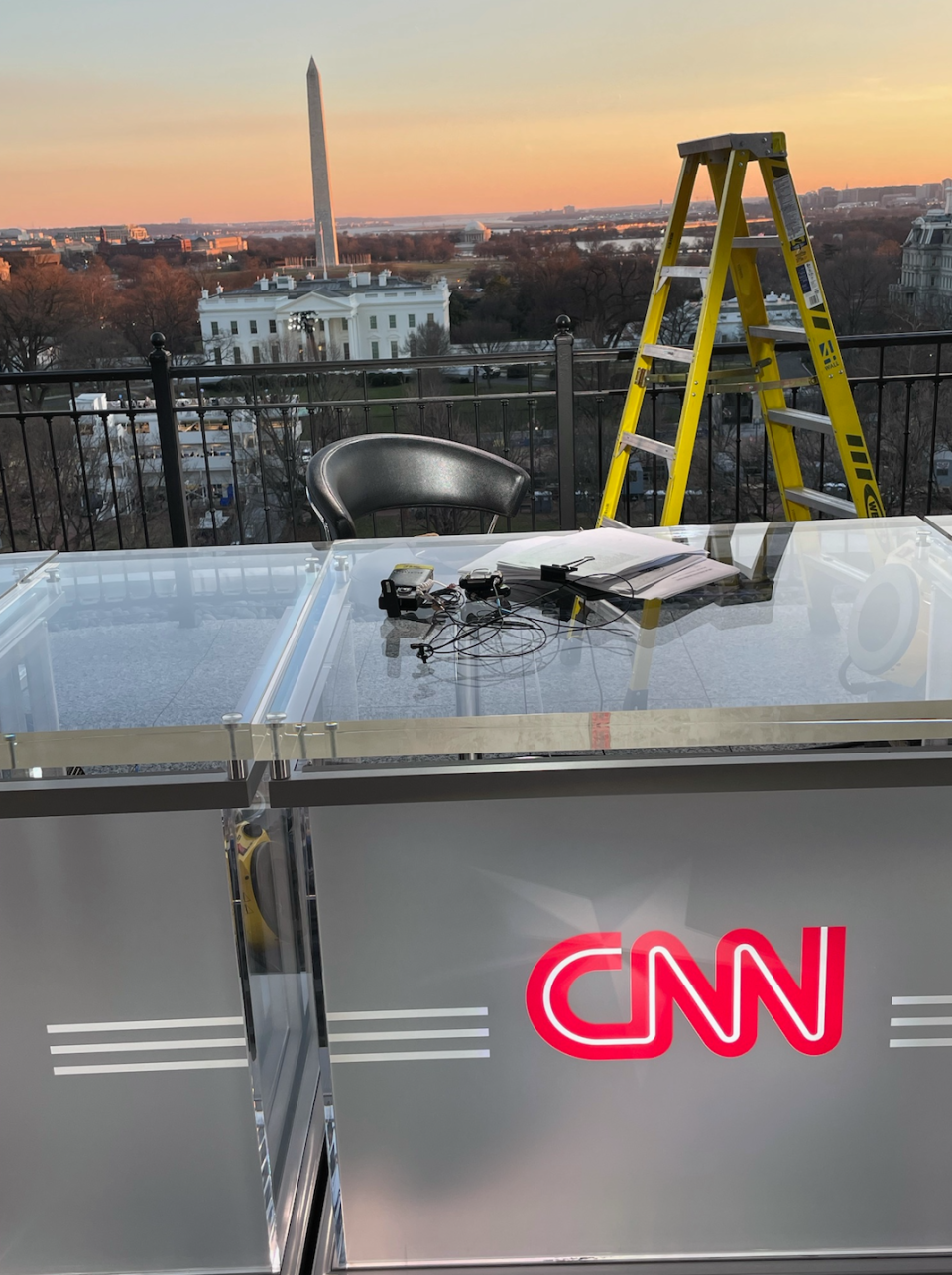
Logistically, COVID-19 makes everything harder for production because you have to spread everything out; you have to have fewer people in places where everyone’s usually crammed together. We spread our control rooms across multiple cities, like we did on Election Night, which is challenging. Instead of using three or four control rooms, we ended up with twelve across three cities. Where we put Abby, Dana, and Jake Tapper was a location where we don’t usually do production. So we figured out what the spot was, how we could do it socially-distanced, and figured out how to shoot it. Usually we’d have 20 to 30 people at an anchor site—I think this year we had eight. And on site, you’ve got to have PPE, you’ve got to make sure everything’s clean, that you have individual packaging for catering, things like that. And then on top of it all, you have all this enhanced security, where people can’t even get to where they need to go.
There are obvious sites that you have every year; you have Capitol Hill, you have Lafayette Park in front of the White House. But there were also things that we didn’t really know was happening until the last minute. Arlington Cemetery has never been a part of Inauguration Day, so that was something brand new that we had to figure out how to broadcast that to our viewers.
All five networks [ABC, CNN, FOX, NBC, and CBS] all work together on production, so we all have different responsibilities. We have to organize everything so every network can get the transmission of all the different pictures from all the different sites. It always surprises people how much we all work together, and how we share the production and transmission responsibilities. One network couldn’t do it all.
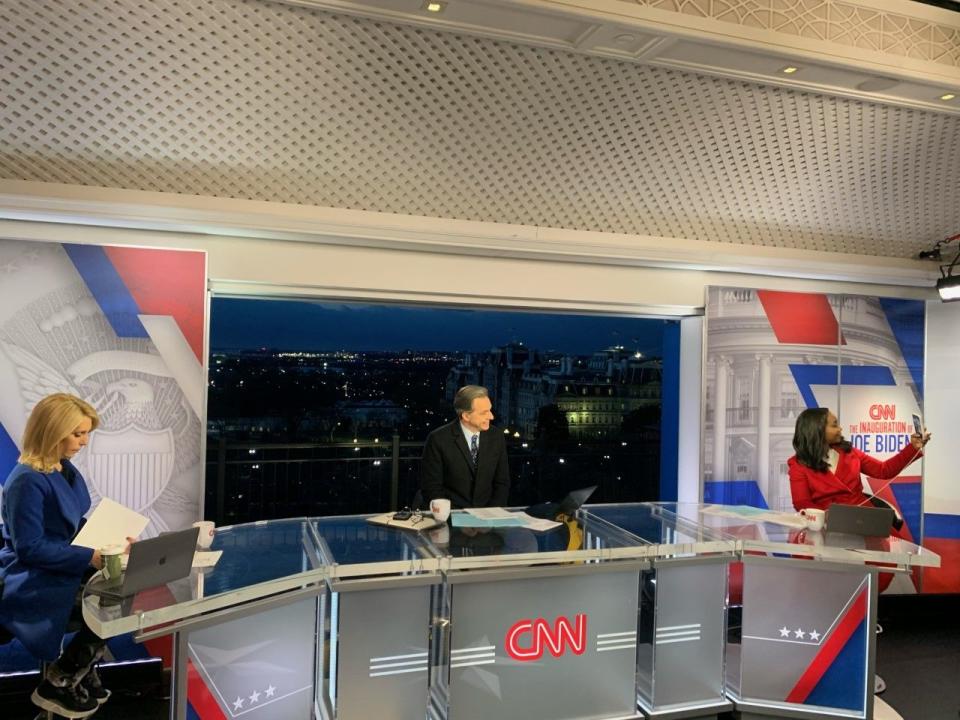
It’s inauguration, so I always think covering swearing in of the Vice President and the President is what’s special in our coverage. A friend of mine texted me, "You're so lucky; you always get to have a front row seat to history." I said, "Yep, you're right." Sometimes I forget that. It's pretty amazing.
Kaitlan Collins, Chief White House Correspondent
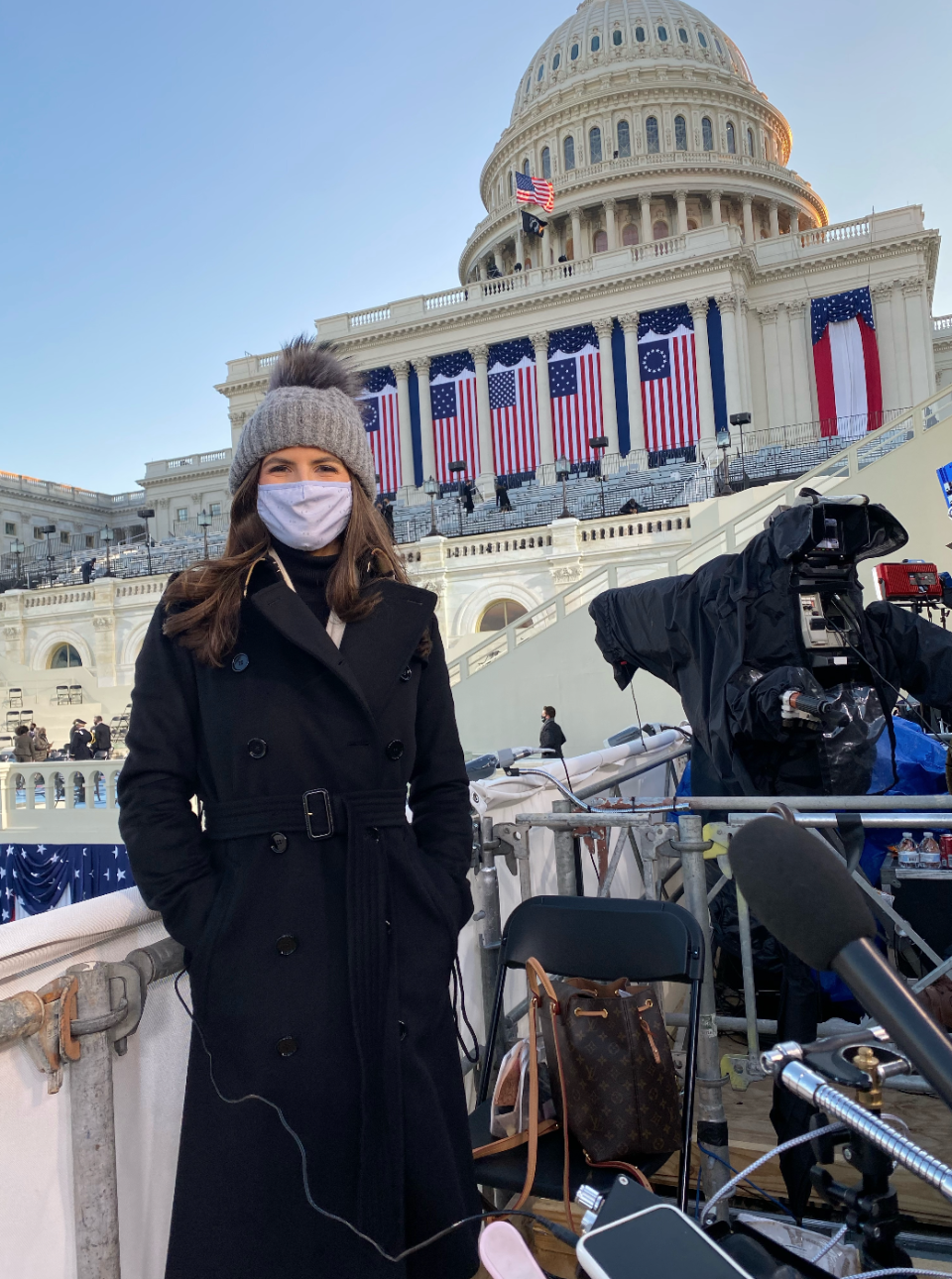
On the past four years
I feel like I’m high intensity all the time, and if it’s too calm, that’s when I get suspicious [laughs]. But that’s what’s been fun about the past four years. It really tested us as reporters in a way that past administrations haven’t. The last four years were so unpredictable, so chaotic, and there were so many history-making moments that I feel so prepared to cover the Biden Administration. There were unpredictable moments where I became the story, and it makes you realize how much you don’t want that to be the case; and how important it is to be in the background and to remove yourself personally from what you’re covering, which has always been my goal ever since day one. It really does teach you that you must watch your conduct and watch your reporting, and you need to make sure that you’re being completely fair. You want to be able to build credibility with your audience, your viewers, your readers, your listeners, so they can trust you to cover Democrats, Republicans, Independents, anybody. I think the best way to do that is removing yourself from the story and coming at it with an unbiased view.
On her new role
The scope of my new role [chief White House correspondent] is changing a lot for me. One is obviously that we’re covering a different administration, and that’s a first for me. With any transfer of power, you’re just getting used to a new press staff, new West Wing aides, a new president. That’s the first challenge that we’ll be facing in the new year. And secondly, the challenge of becoming the chief White House correspondent. I look at it as a leadership role, and you want to make sure that you’re looking out for your team and that you guys are working together to do the best reporting you can. I’m really excited about it.
On the inauguration and how she prepared for it
My day started at 3:15AM after going to bed at midnight. We had to get a COVID-19 test at the White House first, then we went to Capitol Hill to find our spot in the risers in time to start our coverage at 7AM. You’re there and you have this magnificent view of the Capitol. You’re watching the sun come up, and you’re about to witness history with all of these former presidents, the outgoing vice president, all of these Supreme Court justices. It’s an unbelievable, overwhelming experience where I had to take a moment, pause, and really appreciate the fact that I’m witnessing history. It sounds so cliche, but it’s true.
Knowing what my role was going to be, I re-watched the inauguration of Donald Trump from the beginning when the arrivals began to the end, where he’s sworn in and gives this 20 minute speech. I really wanted to watch his speech and compare it to Biden’s, but I also wanted to see the family members that come in, who the president is greeting when he comes on stage, and compare that to what was happening today. You also prepare yourself by getting to know the new officials; you’re so used to covering a certain group for four years, but now there are different people in the federal government and that’s your new focus.
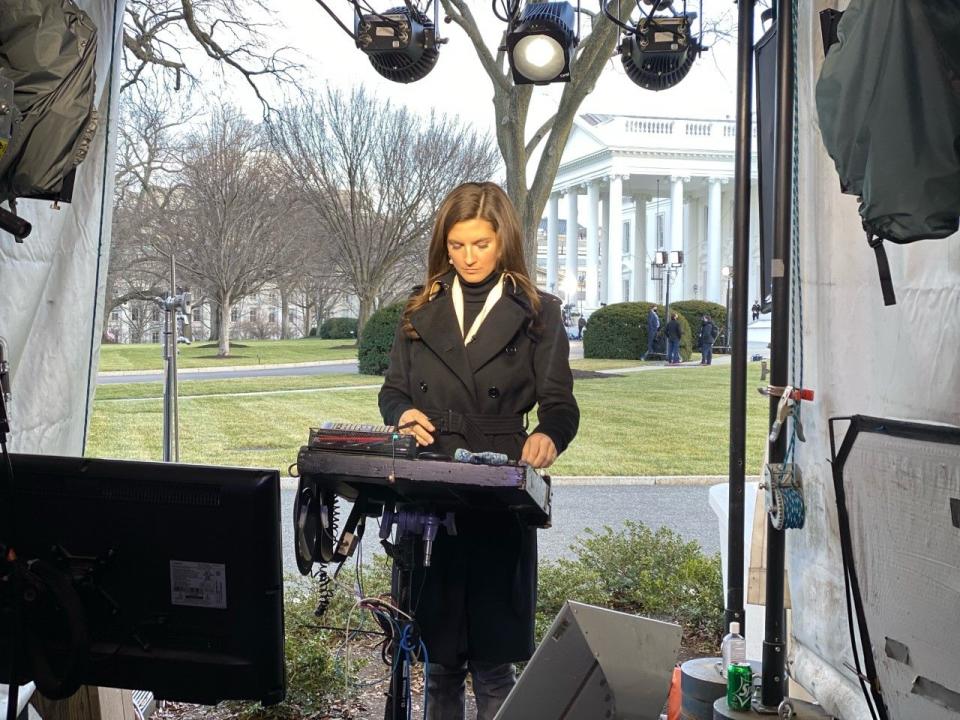
On looking forward to the next four years
One of the smaller things that I’m personally going to keep an eye on are the visitor logs. They stopped releasing them in the Trump administration without any real explanation. The Biden team has said that they’re going to start releasing them again. It’s not a perfect log, but it does give you insight into who’s going into the White House; with Trump, we had to find that out through reporting or spotting people in the driveway.
[In Biden’s speech], he kept saying we're going to talk about facts and we're going to talk about a shared truth. The last two months have shown that misinformation can be a very powerful tool of the presidency. If you want to manipulate facts, you can, which obviously we will push back on and question them, but you still have that power and we saw that with Donald Trump and the lies he spread about the election.
The switch to a new administration isn’t going to change how we report. While the former president and Joe Biden have very different temperaments, they still held the highest office in the land. They wield the same power, so they deserve the same level of scrutiny.
Dana Bash, Anchor of State of the Union with Jake Tapper and Dana Bash and Chief Political Correspondent
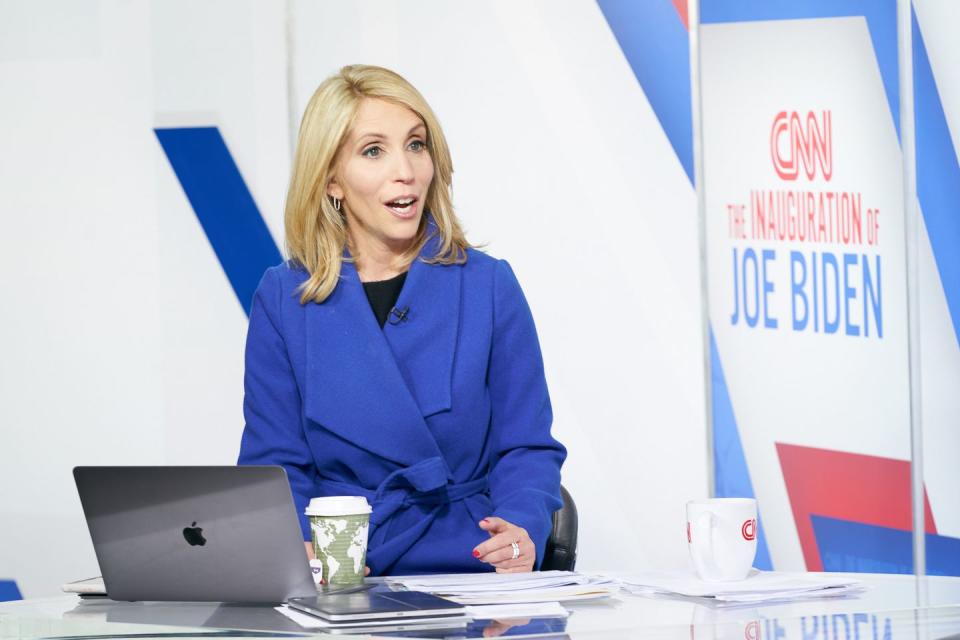
On Inauguration Day
I have been in the Capitol, outside the Capitol, covering the inauguration in some way, shape or form since 2004. This was the first time I haven't been because there wasn't enough space there for us because of a social distancing, which is totally understandable. It was kind of weird not to be there, not to see it in person with my own two eyes, but it was still historic, nonetheless, and I feel so fortunate to be able to be a part of it.
Because these are live events, it's a combination of talking about what the viewers are looking at, why it matters, any insight into the images as they are on the screen throughout the morning, throughout the day. But then there’s also the broader discussion about what we're learning from the president’s speech.There were so many monumental differences with this year’s inauguration compared to those of the past. From former President Trump just taking off and not attending the ceremony to the fact that they couldn’t have a lunch at the Capitol. Usually, after the president is inaugurated, they come into the rotunda, they go into Statuary Hall, and they have a luncheon. And that obviously didn't happen this year because you can't eat with a mask on.
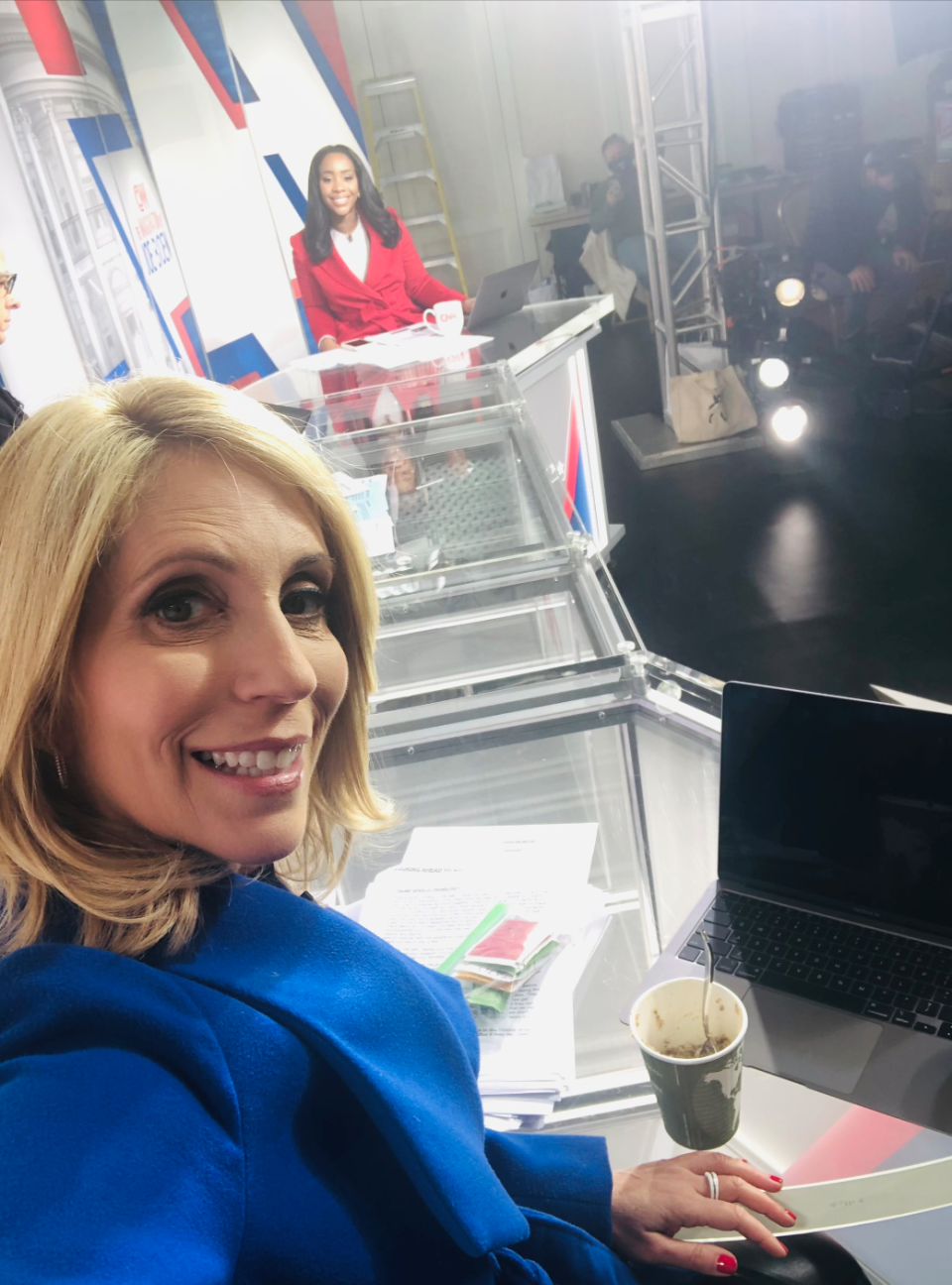
Thank goodness, though, that we got as much as we did from this inauguration; if this was to happen earlier in the pandemic, it probably would’ve been very different. A lot of the people who were involved had been vaccinated, not once, but twice. And we know so much more about the virus now then we did back in March. There's also the physical security given what happened two weeks earlier at that very spot. So considering all of that, all of those factors working against the notion of having that image of a president putting his hand on the Bible, the image of a vice-president, especially a historic nature, like we're seeing with Kamala Harris, putting her hand on the Bible, the fact that we could have that and have such a beautiful ceremony along with it was kind of nice. And it wasn't guaranteed that any of that is going to happen.
Listen, I don't care who you are, where you come from, that was a moment in history to watch. And particularly as a woman to see her do that, and to see the Second Gentleman as the spouse, as opposed to the wife was definitely special. Also, Harris and her family are blended—she has two stepchildren. That’s another snapshot of modern America, in addition to the important milestone of the first woman, the first woman of color, taking over the second highest office in the land.
On the past four years
Never, ever, ever again, will I take the basics of democracy for granted. For the first 20 years of my professional life, I covered people who respected journalism. They didn't always like what we reported. I got yelled at more than I can count from Republicans, from Democrats who didn't like what I reported, not because it was wrong, but because they didn't like the content of it. But they always respected the idea of a free press. I've always liked being a journalist and I enjoy it, but these past four years made me really understand how important it is.
On President Biden and the next four years
I thought his speech was so classic Joe Biden. We’ve been saying so many times since he got the nomination that it’s so clear to voters that he was the man for the moment, even though he wasn’t the youngest, he wasn’t the most diverse candidate in a party that is really embracing diversity. But, according to voters, he was a man for these times. And he stepped up to that plate when he gave his speech.
I’ve covered Joe Biden for a long time, since I started covering the Senate 20 years ago. And that [speech] was authentic. He wasn’t playing a part as the guy who thinks he needs to unite the country because that’s how he got elected. He is the guy who wants to unite the country, who thinks he can do it because of his experience. And whether or not he is going to be successful, we’ll see. But he wasn’t just saying words and giving a lofty speech. That is who he is.
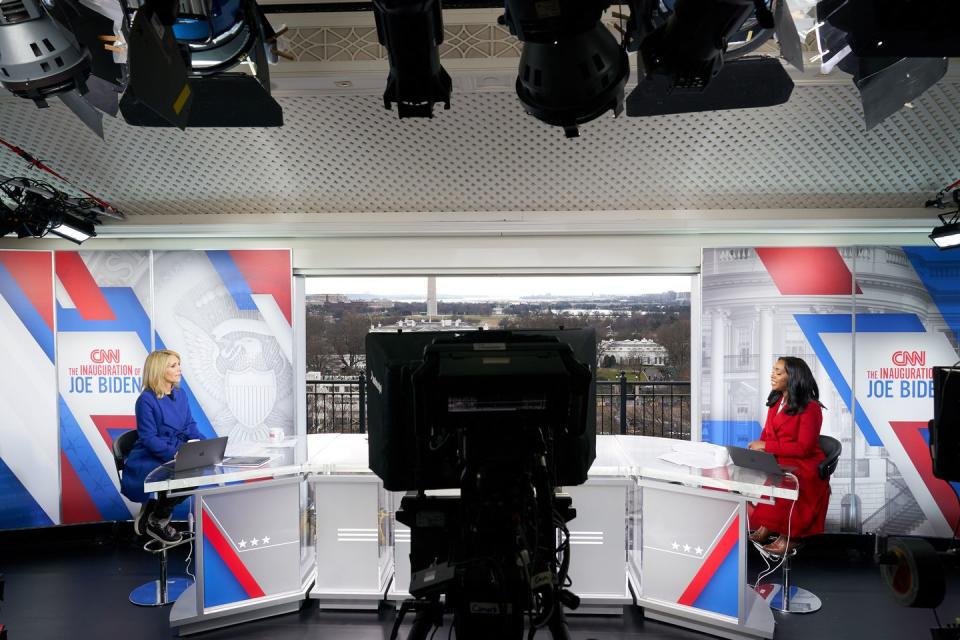
It's kind of a back to the future thing in that we're going to cover a normal White House—normal in that they have basic decency. Having a conversation about their policies on infrastructure, having a conversation about their tax policy, as opposed to tweets, will be so refreshing.
Arlette Saenz, White House Correspondent
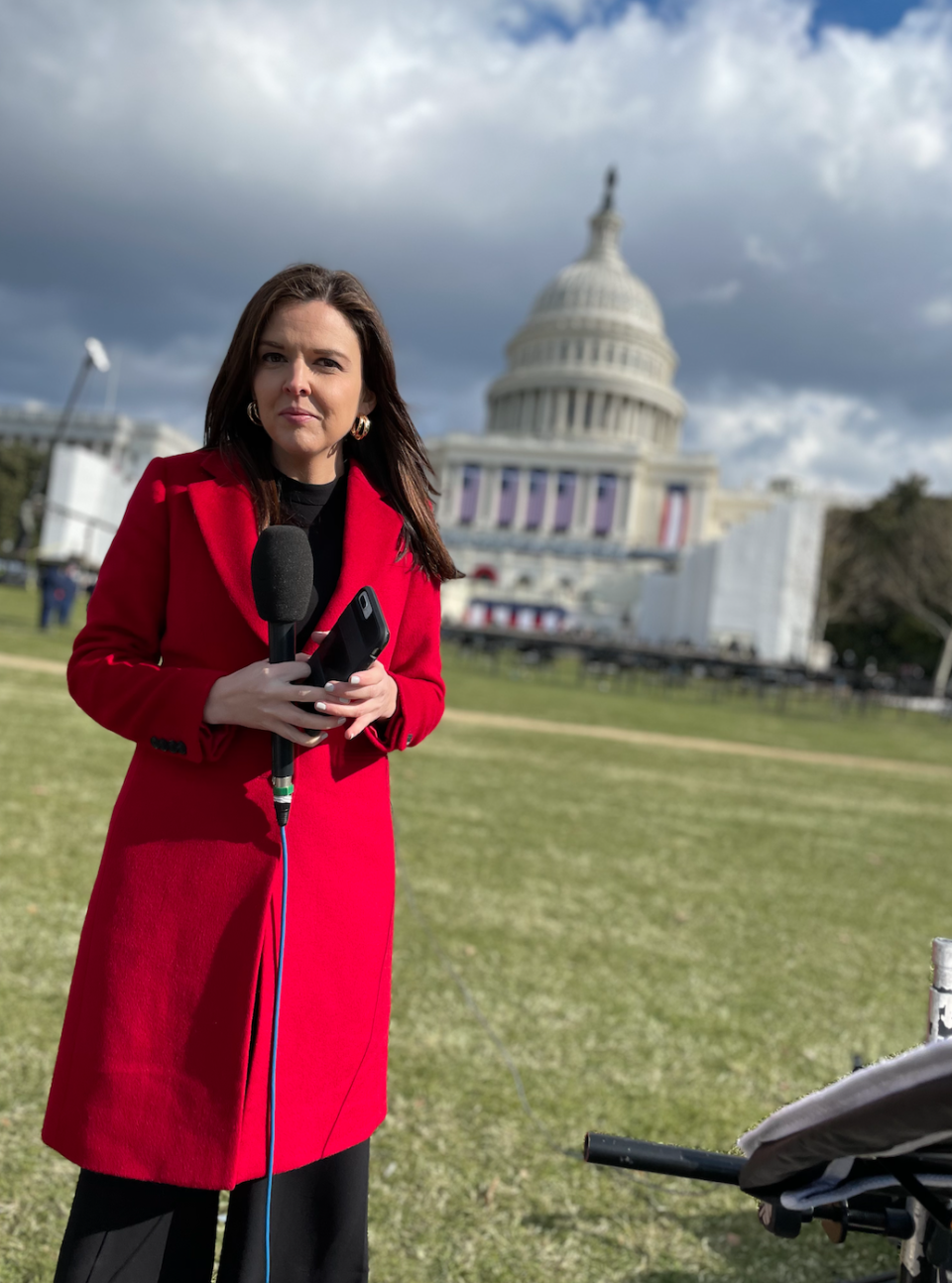
On covering the new administration
We have to hold him accountable to everything that he's doing in office. Our job is to report the facts and to provide viewers and readers with that unique insight into the way that a White House operates because we have the front row seat to history. We have the ability to ask the questions and hold these people accountable.That's part of the job and the public service that we have to do for viewers and readers across the country.
I've covered the White House before under the Obama administration and for part of the Trump administration. It's important that we have this institutional knowledge in some ways to be able to explain to people the way things should, and shouldn’t work.
It's always competitive [with other White House reporters], but we’re all going through the same thing. We understand what access issues are like with a campaign; we get what it's like to wake up at the crack of dawn and jump on a plane. You really kind of form this family and friend group. Even though people might be competitors, it's still important to have that because you're going through it all together.
One thing that was so different is operating in the world of COVID-19. At Biden's events, they were a bit more socially distanced, and sometimes we wouldn't be able to go into the events because of that. So, it’ll be a challenge to keep in mind going forward.
On the next four years
I've been traveling around and living out of hotels for the past two years. I have basically been living out of a suitcase for the past two months since the election was called. I'm really looking forward to being back in DC and having some type of normal life; being able to cook my own food and not feeling like I have to pack and unpack and do laundry and repack. Our lives are always chaotic, but I'm looking forward to at least having a slight bit more stability.
A lot of what we do is based on adrenaline, so trying to find a way to stay centered and not let all the craziness get to you is important. I got a Peloton and I will say that I love it [laughs]. I’m excited, though. It's an honor to get to cover the White House and know that you have the ability to hold these people accountable.
Abby Phillip, Anchor of Inside Politics Sunday with Abby Phillip and Senior Political Correspondent
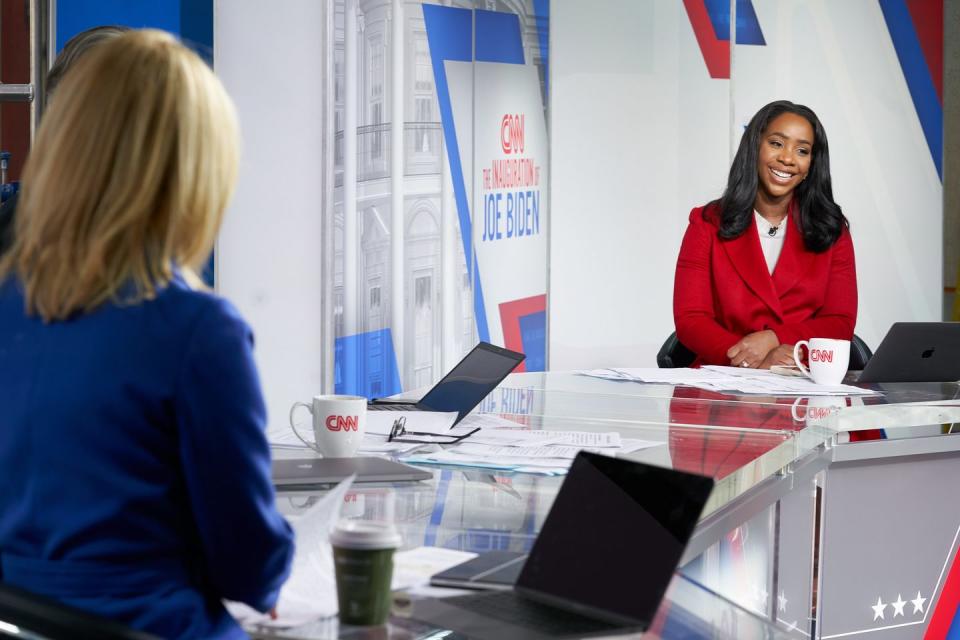
On prepping for the live broadcast
Days like this are mostly stamina days; it's a lot of long hours. We got up at four in the morning and started at seven. There's that element of structuring your preparations so that you're rested and have the energy that you need to get through the day.
At this point, the preparation is in the day-to-day work that we do every day covering all of these people and characters in Washington, while also knowing the story, understanding the policy, and knowing what's going on behind the scenes. There’s historical research about past inaugurations, past inaugural speeches, the ceremony elements of it. There is a lot of information to keep in mind and reference.
But it's not a memorization game. It's knowing what you need to know, so that when you need to reference it for the audience, you can. The rest of the story, the bigger story, which is about the transfer of power, about the outgoing Trump administration, the incoming Biden administration, is a story we've been telling for a long time now. It feels a little bit like second nature at this point.
On the ceremony
This was an inauguration like no other. It was surreal at certain moments, especially earlier this morning. The contrast between [Trump and Biden] could not be more different; it was probably the most stark it could possibly be when Air Force One was getting ready to take off and Trump rally music playing on the tarmac. And during all of this, Biden was in church. Frankly, it was bizarre to that split screen. And I said on air, it's the end of this Trump reality show that we've all been kind of living through for four years.
Literally, the plane wheels up and “My Way” by Frank Sinatra is playing and it's like, it goes to black, like it would in a movie. It was kind of wild to think that that is a president of the United States and this is how he's leaving Washington. We'd gotten kind of used to that stuff, but it's just so not normal. Meanwhile, Biden is at church with other members of Congress and the rest of Washington is just sort of carrying on. That's an unforgettable moment that a lot of us will remember, but it also epitomizes just this bizarre transfer of power that we've experienced, and hopefully we won't experience again, because obviously this is not the way things are supposed to go.
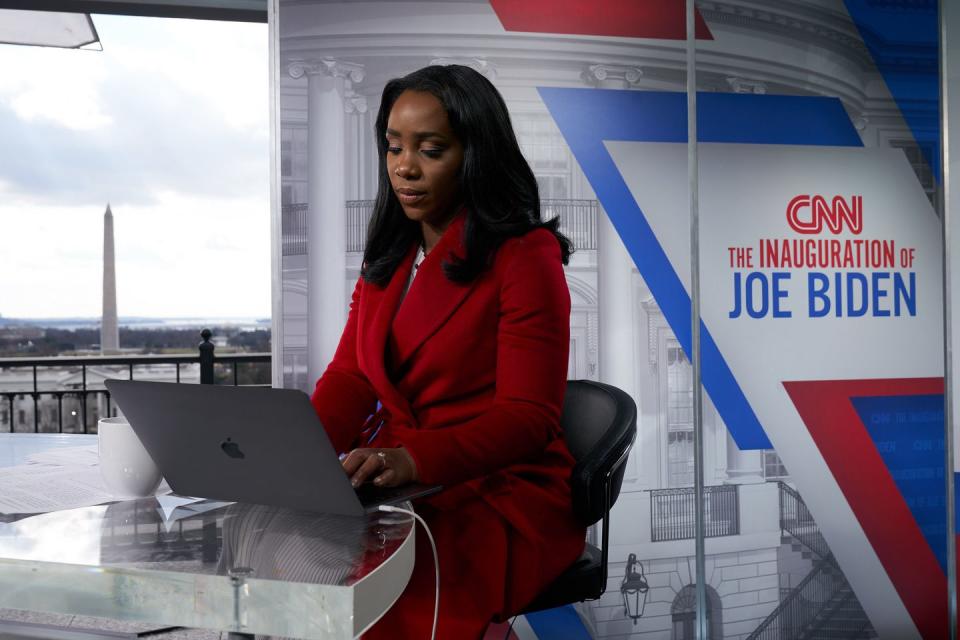
On the Biden White House
I think that this is going to be a very policy-driven White House. This is not a personality contest in the Biden administration, frankly. It is going to be a place where you have a lot of people who are very bureaucratic in nature; they are technical and subject matter experts who are going to be doing their jobs. That's a different kind of accountability because when you're talking about policy, it's about whether or not the idea is actually going to be executed in a way where it does what it's supposed to do.
It might be more interesting or more exciting to cover whether or not the president is angry at his staff. Ultimately, that's not the stuff that matters to real people's lives. We're about to enter into a period where things are going to get a bit boring and that's okay, because that is what governance is about. It's about the details and it's complicated, and for some journalists, especially those who've never covered an administration that wasn't Trump, that might be a little difficult at first. Reporters are going to have to get used to getting deep into policy because there's going to be a lot of it coming out of this administration.
Policy can be hard for viewers to digest, but it all comes back to how it impacts people's actual lives. One of the most important ways to cover policy in a way that's digestible to people is to just help them understand where the ideas are coming from. A lot of times, most ideas are not coming out of thin air, they usually stem from something else that existed before. For example, in the Obama era, when they were passing healthcare, these were some of the same ideas that they had been going over in the nineties with the Clinton administration. So helping people understand the narrative behind policy is important. People care about how it impacts their lives. They want to know when they're going to get their stimulus checks.
On the past four years
Coming out of the Trump administration, I’ve learned the value of being direct about what is and what is not, and just trying to be clear with people about what's happening and what isn't. The truth became such a battlefield for four years. It really puts an emphasis on, when we know things are true, calling that out, when we know things are false, calling that out, and just being direct with people. It’s not always a ‘he said, she said’ type of situation, and it's not always a ‘both sides’ type of situation. And that applies no matter who the administration is. That's probably the biggest lesson that we're all going to take away from this era, is that we need to be clear with people about what the facts are, and no matter who the president is, that's always going to remain the same.
These interviews have been edited and condensed for clarity.
You Might Also Like

